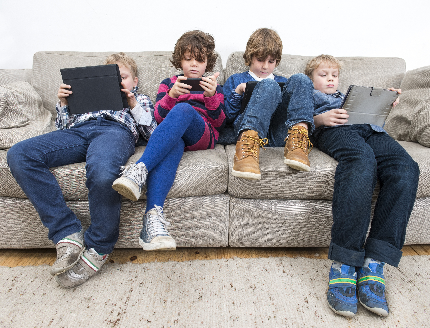How Corona is changing media use - what parents should watch out for now
The special "JIMplus Corona" survey on students' media use during the first phase of school closures found that media use in the everyday lives of 12-19 year olds had increased. For example, young people reported spending more time than before on YouTube videos (82%), listening to music (78%), streaming services (71%) and watching TV (54%). This is also reflected in the usage times: According to the JIM Study 2020, young people spent around 260 minutes a day online from Monday to Friday. This is an increase of around one hour compared to the previous year. Around 60 % of this time is spent on entertainment and games. In contrast, around 40 % of the time is invested in communication and information searches.
For families, the change in everyday life with extended online learning is a challenge and requires a rethink on the topic of screen time. What rules need to be adapted to the new, more digital everyday life? What do you want to stick to in everyday family life? We provide tips and advice below for media use in Corona times.
- In the course of homeschooling, many children and young people use media as tools for school-based learning. This additional screen time should not be subtracted from agreed-upon media use times. A distinction must be made here between free time and learning or working time.
- Media use is not the same as media consumption: When using media, it is generally advisable to distinguish between what children and young people actually do with media. For example, creative and information-related use, such as researching suitable craft instructions on a smartphone, should be viewed positively.
- Regulate media consumption and stay in the conversation: It is often difficult for parents to judge what their children are doing on the screen. They should pay even closer attention, especially now, to when and how long their children spend time in digital games and social networks or watching series. This form of media consumption should also be placed in Corona times during non-school hours or after schoolwork has been completed. As before, it should be limited in time. Therefore, stay in communication about which tasks your child has to do digitally and how much time he or she spends on them.
- Especially now, parents should pay attention to screen-free times and exercise breaks. There are also many non-media activities at home that are entertaining. Younger children in particular need analog activities to process media experiences.
- Children and young people have a right to play and leisure, to participate in cultural and artistic life, and a right to access the media. These rights are guaranteed by the United Nations Convention on the Rights of the Child. If, under current contact restrictions, preservation of these rights can only be guaranteed through digital media, access to them should not be disproportionately restricted. The prerequisite is that you set up this media access in a safe and age-appropriate manner. Information on this can be found in the klicksafe parents' area.
- It is important to accompanychildren in their media use , but the age and developmental stage of the child must always be taken into account. Generally speaking, children and young people also have a right to privacy, for example in the context of their digital communication. For parents, this can be a balancing act between a duty of care on the one hand and safeguarding the child's right to privacy on the other. As the parent, you are the expert for your children and know best what freedom you can allow them. It is ideal if your children know that you are always available as a contact person if problems arise.
- Children and young people base their behavior on role models in their environment. If rules are to be found for media usage time in the family, adults must therefore also always consider their own role model function.
- Regulated media use: Simple basic rules, such as a smartphone ban during joint family meals, should of course remain in place even during the Corona crisis. At Saferinternet.at you will find good ideas for which areas common rules are suitable.
Finding common rules
Clear agreements strengthen the parent-child relationship and mutual trust: To avoid disputes or discussions about smartphone, computer, TV or Internet use in families, amedia use agreementdrawn up jointly and at an early stage can help.
In addition to clear rules, media vouchers can help. They are a good way to illustrate time, especially for younger children. However, media vouchers also support families in adhering to time agreements and help children to independently allocate the "allowed" time appropriately. In this way, children gradually take on more responsibility when it comes to media use.
Not every family is comfortable with this kind of formal written arrangement. Of course, these agreements can also be made verbally. Agreed rules, whether written or verbal, should always be checked for their suitability and adjusted if necessary.
Further information
- klicksafe parents' area: Younger children on the Internet (up to 10 years)
- klicksafe parents' area: Older children on the Internet (10 to 16 years)
- klicksafe flyer: "Mom, can I use your cell phone?"
- klicksafe infographic: "Media use in the Corona crisis" (PDF)
- klicksafe topic area: Well informed in Corona times

